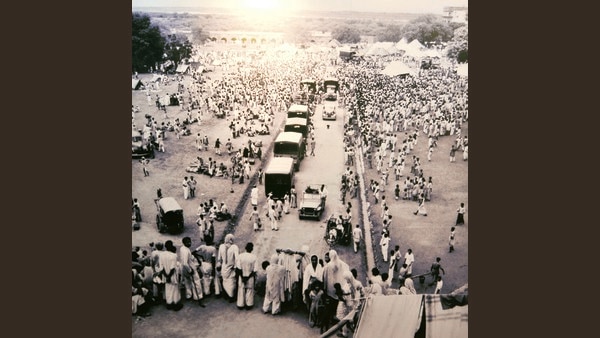New Delhi: My brothers and other family members think they have no future in Pakistan. My Grandfather and his family migrated from Prayagraj & Delhi for a better future in Pakistan. Watt laga di Dada Ji!“
This was a tweet from well-known YouTuber and journalist of Pakistani origin Arju Kazmi. When one sees such remorse, one is bound to wonder if the wheel of time has come full circle. While India has advanced economically from the time it was ruled by the British, Pakistan’s decline is ongoing.
Pakistan was created as a result of contradictory coincidences. Muhammad Ali Jinnah said in Lahore in March 1940 that the British, who “up until yesterday did not pay close attention to what we had to convey, are now beginning to take Pakistan’s demand seriously”. Ishtiaq Ahmed, a Swedish historian of Pakistani descent who has authored credible volumes on Jinnah and the partition of India, has written extensively on this subject.
According to Ahmed, even before World War II, the British government suspected that the Bolshevik revolution would expand outside the Soviet Union. This is why, in the 1930s the Northern Command Headquarters in Rawalpindi was tasked with keeping a watch on Soviet border movements. Six years later, World War II broke out, dividing the world in two.
Berlin, the defeated Germany’s capital, right after the war was a living illustration of this. The Soviets occupied one part of Berlin, while Western powers occupied the other. According to several accounts, everyone was being spied upon at that time. It is reported that the then prime minister of Britain, Winston Churchill, warned US president Franklin D. Roosevelt that they should also occupy Moscow. However, the Allies were hesitant to do so.
British army commanders and foreign policy architects were especially sensitive to this threat. According to Ahmed, the report of Sir Richard Stafford Cripps, a British Labour Party politician, barrister, and diplomat who drew the blueprint for India’s partition, had been presented , but London was in a dilemma. Jinnah’s statement cited earlier proves this.
Several among British rulers believed that the Indian subcontinent should be kept under British authority for two to three decades more. They believed that doing so would save money for the British forces. They would raise Indian armies with Indian funding and deploy them as needed. The same thing was done during the first and second world wars, but things did not go as intended. The UK’s economy crumbled, and the democratic transition in the world had already begun. In their occupied colonies, the French, Dutch and Portuguese were also burning their hands.
Meanwhile, on 12 May 1947, Field Marshal Montgomery met with prime minister Clement Attlee, who was accompanied by senior generals and diplomats such as Sir Leslie Hollis. They claimed that India was a socialist country by nature. ‘In such a case, if we do not establish a religion-based Pakistan, Kremlin’s influence is likely to extend all the way to the Indian Ocean,’ they argued. No wonder, then, that viceroy Lord Mountbatten announced the partition of India on 3 June 1947.
It is a known fact that Pakistan’s economy was stronger than ours only until the 1980s, but then its growth momentum faltered. Pakistan was the only country that was established on the basis of faith. It is no wonder then that it remains trapped in the hands of religious fundamentalist. A number of rulers were assassinated here, many others were toppled repeatedly, and all this has pushed that country to the confusing crossroads of theory and practice.
The army there has dreamed of Ghazwa-e-Hind (a prophecy in some hadiths where an Islamic army invades and conquers the Indian subcontinent, as part of events leading to the eventual apocalypse) since the time of Gen. Ayub Khan. The ghost of the “shadow war” it embraced has now engulfed it. Even bread has become a nightmare for millions of Pakistanis today. The tweet by Arju Kazmi cited earlier describes the feelings of millions of people who witnessed the dream of Quaid-e-azam Jinnah being destroyed. This is why some individuals on both sides of the border have begun to construct dreams of unity again. But is it possible?
People like these believe that if East and West Germany can reunite after 45 years, so can India and Pakistan. Nothing is impossible, but there are several obstacles in the way. Between East and West Germany, the wall was one of ideology. The wall that separates us is one built on religion. This is why there is uncertainty on whether violent religious groups will allow this to occur.
Shashi Shekhar is editor-in-chief, Hindustan. Views are personal.
Download The Mint News App to get Daily Market Updates.
More
Less
#Separated #wall #raised #solely #basis #religion
